Despite the Trump administration’s announced December 2018 Africa strategy, a significant gap between the lofty blueprint and the concrete actions needed to turn it into reality remains. U.S. interests in the region are being increasingly undermined as China, Russia, and other powers move to fill the policy spaces left vacant by the United States and other Western nations. Admittedly, attention to what has crucial value for African publics may not be a typical priority in the crafting of U.S. foreign policy; however, attention to African preferences and policy priorities should be of heightened attention if the U.S. is serious about successfully countering the $10 billion Chinese soft power initiative and better competing with other global players.
Overall, as AfroBarometer survey data shows, the value preferences of African publics and policy priorities—such as subscription to democratic norms (7 out of 10 Africans in the sample countries express support for democratic governance and government accountability) and desire to see more investment in health and education (health, education, and infrastructure were most frequently cited by respondents after unemployment when asked where leaders’ priorities should lie)—broadly align with traditional U.S. values as well as recent U.S.-Africa development cooperation initiatives. At the same time, however, Africans’ opinions do not always align with U.S. policy priorities, most notably regarding the attachment of economic or political conditionalities to development assistance and national control over development spending. Given China’s increased unconditional spending and attention to the region, as well as emphasis on Africa’s stated priorities such as improved infrastructure, it’s no wonder China and partners with similar strategies have been gaining influence on the ground so quickly.
But all is not lost for the U.S. programs, as the African Growth and Opportunity Act (AGOA), the President’s Malaria Initiative, the President’s Emergency Plan for AIDS Relief (PEPFAR), Power Africa, the Millennium Challenge Corporation (MCC), and the Young African Leaders Initiative (YALI), among others, have clearly made their mark, and such initiatives provide a roadmap for charting a foreign policy course that aligns with the aspirations and values of African publics, and is, at the same time, consistent with American values. We believe this is the best way to build a durable alliance with the people of the continent, and, through them, with their governments. In short, this strategy is a smart approach for making America a more competitive global player while safeguarding its geopolitical interests.
So, what do Africans want from their government?
When it comes to policy priorities, the most recent round of Afrobarometer surveys (conducted in 18 African countries between late 2019 and 2020) reveals that Africans want their governments to prioritize jobs and health, followed by physical infrastructure/roads, education, and water (Figure 1).
Note: Answers shown are from 15 countries between 2011-2020. Specifically, respondents were asked: In your opinion, what are the most important problems facing this country that government should address? Respondents could give up to three responses. The figure shows the percent of respondents who mention the issue.
U.S. foreign aid already emphasizes health: After emergency response spending, health spending (including for HIV/AIDS) constitutes the largest category of American foreign assistance to Africa. In fact, the U.S. provided close to $3.5 billion dollars toward better health outcomes in Africa in 2018 alone. Given the unprecedented public health challenges caused by the COVID-19 pandemic and the importance of health needs to African citizens, the U.S. should consider increasing this aid.
Similarly, given the increased importance of job creation to everyday African citizen, directing more aid toward efforts that (directly or indirectly) lead to job creation—or at least making a better case for why investment in areas such as education, infrastructure, and electricity is directly tied to economic growth and jobs—might also increase positive sentiments toward the U.S. in the region.
Who should decide how aid is spent? African, Western, and Chinese approaches
Nationalist sentiments have increased in Africa in recent years, and with them has come an increased desire for control over domestic affairs. As shown in Figure 2 below, a majority of those polled agree that their government should retain full autonomy over development assistance. The poll also showed that a slight majority of Africans dislike aid conditionality, even when the rules are designed to promote democracy and human rights, which they do support (Figure 3). In other words, the majority of Africans do not wish to be dictated to by outsiders, even if this is accompanied by material assistance intended to strengthen democratic values that they support—a finding that reveals key differences in the Western approach (offer aid but use it as a bargaining chip for liberal reforms) and the Chinese approach (offer aid with no requirements of domestic policy change). Although African countries are still relatively young, African nationalism and pride are quite prominent and have real implications.
Note: Answers shown are from 18 countries between 2019-2020. The figure shows the percent of respondents who “agree” or “agree very strongly” with each statement. Respondents were asked: Which of the following statements is closest to your views?
- When other countries give loans or development assistance to [insert country], they should enforce strict requirements on how the funds are spent.
- When other countries give [insert country] loans or development assistance, they should allow our government to make its own decisions about how to use the resources.
Note: Answers shown are from 18 countries between 2019-2020. The figure shows the percent of respondents who “agree” or “agree very strongly” with each statement. Respondents were asked: Which of these statements is closest to your views?
- When other countries give loans or development assistance to [insert country], they should enforce strict requirements to make sure our government promotes democracy and respects human rights.
- Even if other countries give [insert country] loans or development assistance, our government should make its own decisions about democracy and human rights.
What political values matter to Africans?
The findings from the Afrobarometer surveys demonstrate fairly consistent support for both democratic norms and accountable governance among Africans. In fact, popular support for core democratic ideals and institutions has remained stable or increased over time. Seven out of 10 Africans express preference for democracy, and even larger percentages reject one-man (81 percent), single-party (76 percent), and military rule (73 percent). Africans have specific expectations for the ballot box as the sole legitimate method for choosing governments, indicated, for example, by their support for the two-term limit on presidential tenure (Figure 4). Indeed, Africans prefer accountable governance over “getting things done,” suggesting that democratic governance is valued by ordinary citizens across the continent, even if it comes with costs. Therefore, a values-led foreign policy that reinforces democratic norms and accountable governance would be expected to find public support in Africa, even if it rankles incumbent autocratic leaders. Conversely, the U.S. should continue to be very cautious in its dealings with dictators, even if they claim to provide effective governance.
Note: Answers shown are from 15 countries tracked from 2011/2013 to 2019/2020. Specifically, the percentage of citizens who support the following statements:
- “Democracy is preferable to any other kind of government.”
- “We should choose our leaders in this country through regular, open, and honest elections.”
- “It is more important for citizens to be able to hold government accountable, even if that means it makes decisions more slowly.”
- “Constitution should limit the president to serving a maximum of two terms in office.”
Lessons learned: Shared values can lead to shared successes
U.S. diplomatic and aid efforts focused on jobs, health, infrastructure, and education will receive the most support from African publics and will ultimately help address complex issues such as fragility, insecurity, violent extremism, and illegal immigration. U.S. efforts should also focus on democratic norms and accountable governance, both because they are strongly and consistently supported by African citizens and because they will ultimately better U.S. commercial engagement with the region. Such an approach would be efficient, effective, and impactful, without necessarily having to match China’s pledged $60 billion in loans, aid, and broader financial support to the region. All in all, the incorporation of the citizen perspective should be important for shaping U.S. foreign policy toward Africa as it makes America more competitive on the continent and advances mutual U.S.-Africa interests.
The Brookings Institution is committed to quality, independence, and impact.
We are supported by a diverse array of funders. In line with our values and policies, each Brookings publication represents the sole views of its author(s).


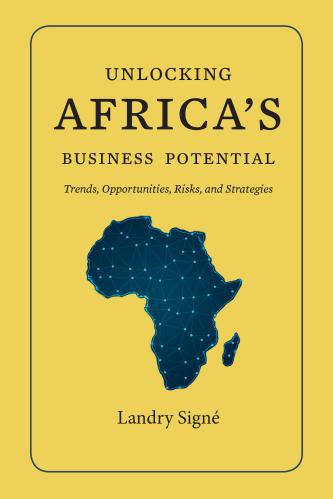



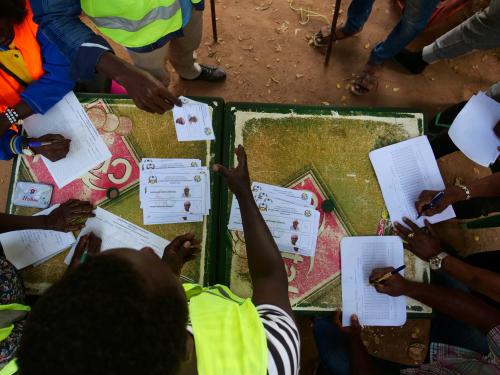
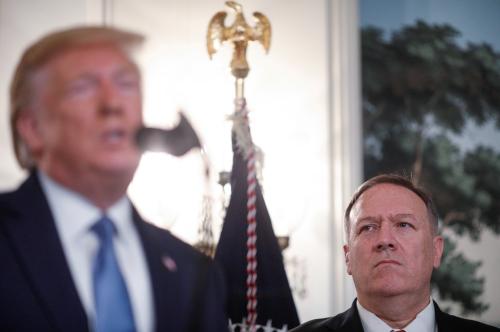
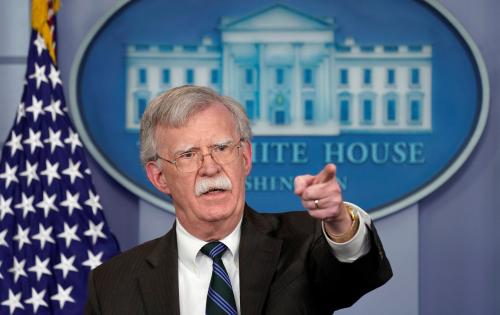
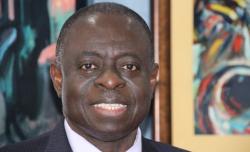




Commentary
US foreign policy toward Africa: An African citizen perspective
October 23, 2020